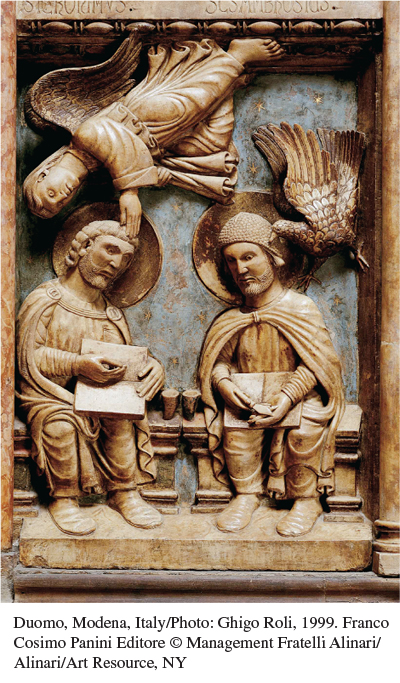A History of Western Society: Printed Page 190
A History of Western Society, Value Edition: Printed Page 179
A History of Western Society, Concise Edition: Printed Page 190
The Church and Its Leaders
The early Christian Church benefited from the administrative abilities of church leaders. With the empire in decay, educated people joined and worked for the church in the belief that it was the one institution able to provide some stability. Bishop Ambrose of Milan (339–397) is typical of the Roman aristocrats who held high public office, were converted to Christianity, and subsequently became bishops. Like many bishops, Ambrose had a solid education in classical law and rhetoric, which he used to become an eloquent preacher. He had a strong sense of his authority and even stood up to Emperor Theodosius, who had ordered Ambrose to hand over his major church — called a basilica — to the emperor:
At length came the command, “Deliver up the Basilica”; I reply, “It is not lawful for us to deliver it up, nor for your Majesty to receive it. By no law can you violate the house of a private man, and do you think that the house of God may be taken away? . . . But do not burden your conscience with the thought that you have any right as Emperor over sacred things. . . .
The emperor relented. Ambrose’s assertion that the church was supreme in spiritual matters and the state in secular issues was to serve as the cornerstone of the church’s position on church-

Gradually the church adapted the organizational structure of the Roman Empire begun during the reign of Diocletian. The territory under the authority of a bishop was also called a diocese, with its center a cathedral (from the Latin cathedra, meaning “chair”), the church that contained the bishop’s official seat of power. A bishop’s jurisdiction extended throughout the diocese, and he came to control a large amount of land that was given to or purchased by the church. Bishops generally came from prominent families and had both spiritual and political power; as the Roman Empire disintegrated, they became the most important local authority on many types of issues. They claimed to trace their spiritual ancestry back to Jesus’s apostles, a doctrine called apostolic succession. Because of the special importance of their dioceses, five bishops — those of Antioch, Alexandria, Jerusalem, Constantinople, and Rome — gained the title of patriarch.
After the capital and the emperor moved to Constantinople, the power of the bishop of Rome grew because he was the only patriarch in the Western Roman Empire. The bishops of Rome stressed that Rome had special significance because of its history as the capital of a worldwide empire. More significantly, they asserted, Rome had a special place in Christian history. According to tradition, Saint Peter, chief of Jesus’s disciples, had lived in Rome and been its first bishop. Thus, as successors of Peter, the bishops of Rome — known as popes, from the Latin word papa, meaning “father” — claimed a privileged position in the church hierarchy, an idea called the Petrine Doctrine that built on the notion of apostolic succession. They stressed their supremacy over other Christian communities and urged other churches to appeal to Rome for the resolution of disputed doctrinal issues. Not surprisingly, the other patriarchs did not agree. They continued to exercise authority in their own regions, and local churches did as well, but the groundwork had been laid for later Roman predominance on religious matters.
In the fifth century the popes also expanded the church’s secular authority. Pope Leo I (pontificate 440–461) made treaties with several barbarian leaders who threatened the city of Rome. Gregory I (pontificate 590–604), later called “the Great,” made an agreement with the barbarian groups who had cut off Rome’s food supply, reorganized church lands to increase production, and then distributed the additional food to the poor. He had been an official for the city of Rome before he became a church official, and his administrative and diplomatic talents helped the church expand. He sent missionaries to the British Isles (see “Missionaries’ Actions”) and wrote letters and guides instructing bishops on practical and spiritual matters. He promoted the ideas of Augustine (see “Saint Augustine on Human Nature, Will, and Sin”), particularly those that defined church rituals as essential for salvation. The Western Christian Church headed by the pope in Rome would become the most enduring nongovernmental institution in world history.